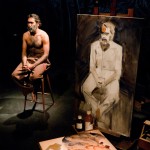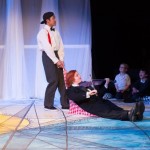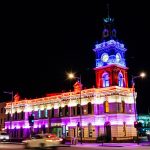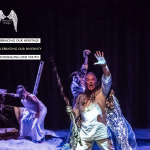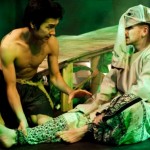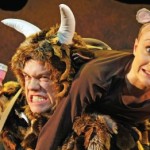The Conspirators
Genre: Comedy Drama
Venue: Orange Tree Theatre, 1 Clarence Street, Richmond, Surrey TW9 2SA
Low Down
Sam Walters & The Orange Tree Theatre’s relationship with Vaclav Havel reveals a long and fruitful history, so its fitting that the artistic director stages the UK premiere ofThe Conspirators to begin the theatre’s 40th anniversary season. The play is a political satire, which Havel completed in 1971, a rather neat excuse for a double celebration. Part soap opera and part vaudeville, it portrays how a dystopia’s powerful elite pursues and plots against ‘conspiracy theories’. Dramatic ironies ripple down through successive scenes like dominoes. The audience, placed in a position of viewing how imagined plots actually destroy the Rule of Law, comes to understand how would-be saviours of the State have their conspiracy theories confirmed and ‘the enemy’ – in Havel’s play the tyrant Olah – returns to rule again!
Review
The Conspirators is structured episodically around the home of a wealthy citizen (Helga & family), and offices of the judiciary (Dykl the Chief Prosecutor & other judges) and the police (Moher, Chief of Police & body guards). These three locations draw in a large ensemble of characters: five characters consisting of the rich widow Helga, the Chief of Police Moher, the Major Ofir, the State Prosecutor Dykl and the Censor Aram assemble, in various configurations, in every scene. In contrast, the poor prisoner Alfred Stein is limited to the Colonel’s office for interrogation & torture and the democratically elected Prime Minister is managed through the Chief Prosecutor and the Chief of Police.
The State we view on stage is unnamed geographically and the term ‘new democracy’ in 1971 (as in 2011) could have been applied to many places in South America, Eastern Europe and Africa. Havel’s dystopia is nonetheless easily identified as a society where choice and debate threaten those with vested interests. Consequently, the lead characters representing the politically powerful are continually looking for ‘strong’ and simple solutions. To show their single-mindedness, Havel portrays them as performing certain actions and speeches repeatedly. This makes their paranoia seem simultaneously both more comic and sinister as it blends with an ethos of violence and sexual perversion for political gain.
The Conspirators was the first play that Havel wrote after his work had been banned in Czechoslovakia and that it took him five years to complete. Havel’s personal experience of a regime whose fears had given rise to conspiracy theories cannot be underestimated.
Sam Walter’s interpretation of Havel’s play as a naturalistic drawing-room comedy seems to work against his theatre’s configuration as theatre-in-the-round. There are too many scene-changes which require large pieces of furniture to be moved again and again. This results in unacceptable gaps in flow of entrances and exits on stage. Perhaps, more importantly, the set design and lighting undermine the pressurized political atmosphere which the characters are attempting to create through the Havel’s dialogue. As a result, for instance, Helga’s (Lucy Tregear) sexual manipulations of the Major, the Colonel and the Prosecutor remains virtually unrealizable.
Robyn Wilson’s costuming also seemed to be inconsistent: sometimes realistically defining a particular time period and class of character and then, for other characters suggesting a non-naturalistic iconic effect. For instance, the prisoner Stein wore the classic ‘old fashioned’ white and black-arrowed penal suit but had perfectly new and modern runners for footwear. Military and police uniforms ranged from sword-carrying officer attire to jungle-camouflage. Helga’s chic Paris frock in autumnal colours and her little girl shoes with pretty bows made her look like a modern woman. Its straight slim line looked totally unsuited for her sado-machistic scenes with the Colonel: surely in real life such a dress would have been taken off in order to run about as aggressively as is her desire.
Nonetheless, the production contains many good performances. Christopher Ravenscroft as Dykl the State Prosecutor was superb. He seems to build his character in detail in both a physical and symbolic sense and delivers a very fine representation of a powerful man past his potency. In doing so, Ravenscroft captures the failed sense of justice in the State in every part of his presentation. He shows how conspirators are often idealists who come to embody their unrealized passions, together with their loss of courage. The other impressive performance for me was the Censor whose depiction of inane stupidity flags the simpleminded pursuit of fear-driven power.
The Conspirators is a bold choice for a play which Orange Tree Theatre has chosen to launch its 40th anniversary. Despite some concerns with its direction and design, the production is worth viewing. Such political and artistic wisdom by both the Czechoslovakian playwright and Orange Tree is worth embracing.
Reviewed by Josey De Rossi Friday 3rd September 2011
Website :
www.orangetreetheatre.co.uk
